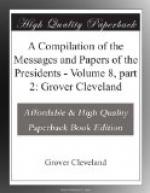My attention has been called during the recess of Congress to abuses existing in the collection of the customs, and strenuous efforts have been made for their correction by Executive orders. The recommendations submitted to the Secretary of the Treasury by a commission appointed to examine into the collection of customs duties at the port of New York contain many suggestions for the modification of the customs laws, to which the attention of Congress is invited.
It is matter of congratulation that notwithstanding the severe burdens caused by the war the public faith with all creditors has been preserved, and that as the result of this policy the public credit has continuously advanced and our public securities are regarded with the highest favor in the markets of the world. I trust that no act of the Government will cast a shadow upon its credit.
The progress of refunding the public debt has been rapid and satisfactory. Under the contract existing when I entered upon the discharge of the duties of my office, bonds bearing interest at the rate of 4-1/2 per cent were being rapidly sold, and within three months the aggregate sales of these bonds had reached the sum of $200,000,000. With my sanction the Secretary of the Treasury entered into a new contract for the sale of 4 per cent bonds, and within thirty days after the popular subscription for such bonds was opened subscriptions were had amounting to $75,496,550, which were paid for within ninety days after the date of subscription. By this process, within but little more than one year, the annual interest on the public debt was reduced in the sum of $3,775,000.
I recommended that suitable provision be made to enable the people to easily convert their savings into Government securities, as the best mode in which small savings may be well secured and yield a moderate interest. It is an object of public policy to retain among our own people the securities of the United States. In this way our country is guarded against their sudden return from foreign countries, caused by war or other disturbances beyond our limits.
The commerce of the United States with foreign nations, and especially the export of domestic productions, has of late years largely increased; but the greater portion of this trade is conducted in foreign vessels. The importance of enlarging our foreign trade, and especially by direct and speedy interchange with countries on this continent, can not be overestimated; and it is a matter of great moment that our own shipping interest should receive, to the utmost practical extent, the benefit of our commerce with other lands. These considerations are forcibly urged by all the large commercial cities of the country, and public attention is generally and wisely attracted to the solution of the problems they present. It is not doubted that Congress will take them up in the broadest spirit of liberality and respond to the public demand by practical legislation upon this important subject.




